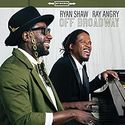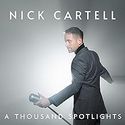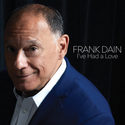|
 RYAN SHAW (vocals) & RAY ANGRY (keyboards) RYAN SHAW (vocals) & RAY ANGRY (keyboards)
OFF BROADWAY
Center Stage Records
Digital
Don't get confused. Here's a collection of boldly reimagined musical theatre material called Off Broadway, but, despite the title that cues expectations, none of the songs are from Off-Broadway shows. Woven through the exciting album by dynamic singer Ryan Shaw and creative arranger/keyboardist Ray Angry is the 1963 pop hit "On Broadway"–which itself landed on Broadway when it was included in the revue Smokey Joe's Cafe three decades later. While enjoyable, using it seven times between the other tracks, each indicated as a separate, numbered "Interlude," becomes too much of a good thing, despite some being shorter or just a little longer than a minute, with variety in how much of the lyric is used. Otherwise, this adventurous, adrenalin-infused program is a rewarding reinvigoration of repertoire selections that many theatre fans have heard many times–but never quite like these mostly R&B/soul-styled intriguing interpretations. Some purists may protest, eager to jump ship, but the rest of us will be ready, willing and able to enjoy the ride.
The men–joined by guitarist Sherrod Barnes, bassist Paul "Papabear" Johnson, and drummer Jaylen Petinaud–make mesmerizing music together. Also a songwriter, Ryan Shaw's prior album mixed his originals and Marvin Gaye hits: Imagining Marvin was an homage to the singer–one of the music stars he played in the Broadway jukebox musical Motown. This collection might be thought of as a natural extension of that, although the grooves and beat of funky/pop/blues/soul transformations on Off Broadway aren't locked into specific trademark sounds of the 1960s or '70s. That would be pastiche invoking nostalgia.
Musicals with more contemporary/pop-influenced music, as opposed to lilting or bouncy golden-age musical comedies, get the most attention. Dear Evan Hansen's "Waving Through a Window" keeps the sense of the caffeinated energy of the show's original ambience, but benefits from a less manic (but still gripping) attack. The touching "She Used to Be Mine" from Waitress is on the musical menu; it sizzles and settles into a slow burn of woe, the rue becoming more than a sighing lament. Rent's "Without You" gains gracefulness, dreamlike and contemplative, without sacrificing beats (subtle ones) under the elastic Shaw voice.
A couple of other picks showcasing Ryan Shaw's vocals are potent, too, and, like the song "On Broadway," weren't born on Broadway, but ended up there. A seemingly unlikely choice to start things off is a Frank Sinatra signature hit which got its Broadway connection via being part of the dance-centric production recycling his repertoire, Come Fly Away. But it's not just any Sinatra song for Mr. S. and Mr. A.: it's "My Way," forecasting their mission statement that they're going to do established songs their way. Another surprise is "Surprise Surprise," listed here as just "Surprise"; it's the number added for the movie version of A Chorus Line.
Intended for the stage, but emerging as a concept album first, Jesus Christ Superstar is a show Shaw performed in (as Judas, in Chicago). The score's "Gethsemane" (sung by Jesus in the musical) is the choice for this album. Its lengthy opening passage on keyboard brings sumptuous classical music flavors and later swings (!) and the vocal heats up. Full creative partner, appropriately getting equal billing on the cover, Ray Angry's swaths of instrumental playing command attention and takes the reins as star for a concerto-esque meditation on "Send in the Clowns." Although we hear some vocal sounds far off in the distance, the lyric is not employed.
The one representative of classic musical theatre is a gem from My Fair Lady: "On the Street Where You Live." More groovy than grand, the ungirdled wallow in pleasure is a street-smart adoption for the soul parade. Notably, this particular show tune showed up on one-time-only change-of-pace albums by R&B artists: The Four Tops, The Drifters, and the aforementioned Marvin Gaye.
If all this genre-reassignment experimentation is "identity theft," then there's honor among thieves. It's done with class.
 NICK CARTELL NICK CARTELL
A THOUSAND SPOTLIGHTS
Club44 Records
CD | Digital
Sincerity radiates through Nick Cartell's collection called A Thousand Spotlights. There's sentiment, but it doesn't get sticky or stale. He ably takes up some uplifting numbers that originated in animated Disney features. While there are just three of them, their presence feels more prominent because the collection has only nine tracks. Two have the word "heart" in their titles and the tenor sings them with lots of heart and unabashed fondness: "A Dream Is a Wish Your Heart Makes," from Cinderella; and, with a delicate instrumental opening that suggests opening an antique music box, there's the promise that "You'll Be in My Heart" from Tarzan. The third Disney item is a rollicking one. It's "Why Should I Worry?" from Oliver & Company. It's breezy and brash enough to counteract the sugar content of the others on this set by the likeable gentleman who sounds at home with serious grown-up drama, too. It's a sonically impressive project, with accompaniment by a rhythm section plus the Nashville Recording Orchestra. There are a few background vocalists, including the singer's wife Christine Cartell.
The choice of the album's name, A Thousand Spotlights, references the lyric from an included item by Benj Pasek and Justin Paul, a dramatically determined declaration from the film The Greatest Showman ("All the shine of a thousand spotlights/ All the stars we steal from the night sky/ Will never be enough"). The lyric's relentless and fervent repetitions of the two words of the song title in question, "Never Enough," may be more than enough for those who don't cotton to hearing that kind of bombast of sameness. It's rather strident, especially on its own (without recalling the context of the movie's plot and characters).
Interestingly, two grand and quite famously intense musical theatre showpieces that often get the all-stops-out drama treatment are more nuanced here. Mr. Cartell's powerful voice is calibrated. Even avid collectors of solo albums by vocalists covering songs from musicals and multiple cast recordings of the same score might reasonably wonder: "Do I really need another version of 'The Music of the Night' from The Phantom of the Opera and must we bring on one more 'Bring Him Home' from Les Misérables?" Surprise! These two showstoppers are warm and welcome, with judicious employment of pow, vulnerability, and money notes. The value of an actor's experience of being in productions of musicals and having time to think about them can't be overestimated; Nick Cartell has been in national tours of both. He was an ensemble member and understudy for Raoul in Phantom and played Jean Valjean, singing the cathartic prayer "Bring Him Home" in Les Miz. And when you enjoy his confident adrenalin-infused "On the Street Where You Live," note that his stage experience also includes playing the role of the chap whose solo it is in My Fair Lady. (Nick Cartell has also been a member of the concertizing group billed as The Broadway Boys, and on the Great White Way in a revival of Jesus Christ Superstar, the short-lived Scandalous and the Cirque du Soleil production called Paramour).
Other show songs on the release are a robust and focused "It All Fades Away" from The Bridges of Madison County and a buoyant "Blue Skies"–the Irving Berlin number plopped into a show called Betsy with a score primarily by new kids on the Broadway block named Rodgers & Hart, 99 years ago. I hope we'll be hearing more from this talented man soon.
 FRANK DAIN FRANK DAIN
I'VE HAD A LOVE
CD | Digital
Conversational in approach, gentle of voice and persona, Frank Dain's singing about being in love avoids blatant blasts of exultation and tearful histrionics. The roller coaster ride that romance can be isn't always a top-speed, clamorous trip over the highs and lows. Does this give you the impression that his album, I've Had a Love, presents a casual, dispassionate, or guarded guy? No, you don't understand. It's quite the opposite. The voice may be light, but emotion is decidedly heavy in the air. The musical dress code: Wearing his heart on his sleeve.
Unfussy, uncluttered, straightforward vocal lines along the landscape of a No-Belting Zone are balanced (some might think upstaged at times) by the strong musicians in the busier arrangements, doing the heavy lifting in creating drama and movement. Pianist/ musical director Kathleen Landis is joined by several instrumentalists–not the same complement of players on each track–some of whom have been members of Broadway pit orchestras (Jim Hynes is on flugelhorn, Aaron Heick plays oboe, Peter Calo is the guitarist, Jack Baskow multi-tasks with sax, clarinet and flute).
There's a sense of respect for the lyrics and melody lines of the standard songs and their proven impact over the decades, via numerous singers' recordings and live performances. The vocalist is seemingly living in the songs, rather than reinventing them or coloring outside the lines much. Phrasing is not wildly inventive, but involved–seemingly deliberate without feeling labored. Diction is notably attentive; final consonants are crisp. Favored in the repertoire choices are non-jaded attitudes, lingering looks at loving through appreciative, glowing eyes. This kind of intoxication and contentment are captured in the readings of two Ira Gershwin lyrics: "Embraceable You" (from the 1930 musical Girl Crazy, melody by brother George) and "A New World" (music by Harold Arlen, from the 1954 film A Star Is Born). Two souvenirs of Frank Dain's cabaret show from several years ago, featuring hits of Johnny Mathis, are highlights on the recording: "The Twelfth of Never" and "A Certain Smile." In his impressive handling of the latter, he finds real depth and bittersweet reflections in what could seem to be more confectionary.
Some oh-so-serious numbers on the ballad-heavy I've Had a Love have more vibrato than verve in the vocals. At times, a listener may want to metaphorically light a fire under the performer to ratchet up the oomph factor. It does arrive (but all too briefly) via the vitality in the lively "Let's Fall in Love." One creative twist on that number is employing the introductory verse not only in its spot at the beginning, but returning to it, in whole or in part, in other places. (Unfortunately, the worthy and charming intro verses written to set up some of the set's other standards aren't heard.) The build-up of bitterness in "No One Ever Tells You" offers welcome variety.
Much of the rest of the 16-track trip through the tunnel of love lingers in the languid lane, a place and pace where the importance of being earnest might be overestimated. While there are advantages to the album's sequencing of the selections to trace the trajectory of true love chronologically (wishing for it, finding it, reveling in it, and losing it), this plan has its downside, too. It makes for a mid-way marathon of mega-mellow numbers. Any one of these cozy gems would be effectively relaxing between mid-tempo tunes, but clumped together it's arguably too much of a sweetly suspended-in-time trio ("Lazy Afternoon" from The Golden Apple, the bossa nova "Corcovado" with its English lyric known as "Quiet Nights of Quiet Stars," and then the lovely lullaby "Sleepy Man" from The Robber Bridegroom).
Depending on the choices of love songs and how singers and musicians guide us through them, we can feel like we're floating on air, traipsing through tough terrain, or navigating a slippery slope. I've Had a Love's mature but lovestruck compromise keeps our feet on the ground, but we're not gliding as if on ice, nor stuck in quicksand, but trudging along on something that gives way a little bit–like sand on the beach. Liner notes by Miss Landis describe the collaboration of developing the moods and arrangements, bit by bit, from conception, options, changes, and negotiations with the singer.
Although he performs live on occasion, often on a bill with other singers in New York City, Frank Dain records even less frequently; this release is a belated follow-up to his debut album from twenty-four years ago! However, he has long been the busy bee behind the scenes of cabaret as editor/writer for the magazine Cabaret Scenes and its online version, arms of The American Songbook Association for which he has other duties. On Mondays in July and August he's a judge in the singing competition at the Manhattan nightclub Don't Tell Mama.
|
|